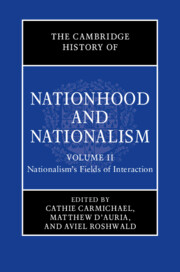Book contents
- The Cambridge History of Nationhood and Nationalism
- The Cambridge History of Nationhood and Nationalism
- The Cambridge History of Nationhood and Nationalism
- Copyright page
- Contents
- Figures
- Tables
- Contributors
- Part I Imperial and Postcolonial Settings
- 1 Building Nation-Empires in the Eighteenth-Century Iberian Atlantic
- 2 Nations and Nationalisms in the Late Ottoman Empire
- 3 The Dutch Empire
- 4 The Habsburg Monarchy
- 5 The British Empire
- 6 The French Empire
- 7 Germany as a “Global Nation,” 1840–1930
- 8 The Russian and Soviet Empire
- 9 The Japanese Empire
- 10 American Internationalism
- 11 The Indian Subcontinent: From Raj to Partition
- 12 Middle Eastern and North African Nationalisms
- 13 African Nationalisms
- 14 Bringing Empires Back in: The Imperial Origins of Nations in Indochina
- Conclusion to Part I
- Part II Transnational and Religious Missions and Identities
- Part III Intersections: National(ist) Synergies and Tensions with Other Social, Economic, Political, and Cultural Categories, Identities, and Practices
- Index
Conclusion to Part I
from Part I - Imperial and Postcolonial Settings
Published online by Cambridge University Press: 08 November 2023
- The Cambridge History of Nationhood and Nationalism
- The Cambridge History of Nationhood and Nationalism
- The Cambridge History of Nationhood and Nationalism
- Copyright page
- Contents
- Figures
- Tables
- Contributors
- Part I Imperial and Postcolonial Settings
- 1 Building Nation-Empires in the Eighteenth-Century Iberian Atlantic
- 2 Nations and Nationalisms in the Late Ottoman Empire
- 3 The Dutch Empire
- 4 The Habsburg Monarchy
- 5 The British Empire
- 6 The French Empire
- 7 Germany as a “Global Nation,” 1840–1930
- 8 The Russian and Soviet Empire
- 9 The Japanese Empire
- 10 American Internationalism
- 11 The Indian Subcontinent: From Raj to Partition
- 12 Middle Eastern and North African Nationalisms
- 13 African Nationalisms
- 14 Bringing Empires Back in: The Imperial Origins of Nations in Indochina
- Conclusion to Part I
- Part II Transnational and Religious Missions and Identities
- Part III Intersections: National(ist) Synergies and Tensions with Other Social, Economic, Political, and Cultural Categories, Identities, and Practices
- Index
Summary
A quick glance across a set of world maps spanning the period from the 1500s to the present creates the impression that an early modern era dominated by empires gave way, by fits and starts over the course of the eighteenth to twentieth centuries, to a modern global system composed of nation-states. Indeed, the prevalent view of nationhood and nationalism as quintessentially modern phenomena is, in part, premised on the typological and chronological contrast between empire (understood as a realm composed of various lands and peoples governed under a diversity of legal and institutional arrangements) and nation-state (understood as a more homogeneously governed polity whose legitimacy is derived from its claim to embody the will and interests of a particular people) and on the notion that the transition from the former to the latter was unidirectional and irreversible.
- Type
- Chapter
- Information
- The Cambridge History of Nationhood and Nationalism , pp. 323 - 328Publisher: Cambridge University PressPrint publication year: 2023



